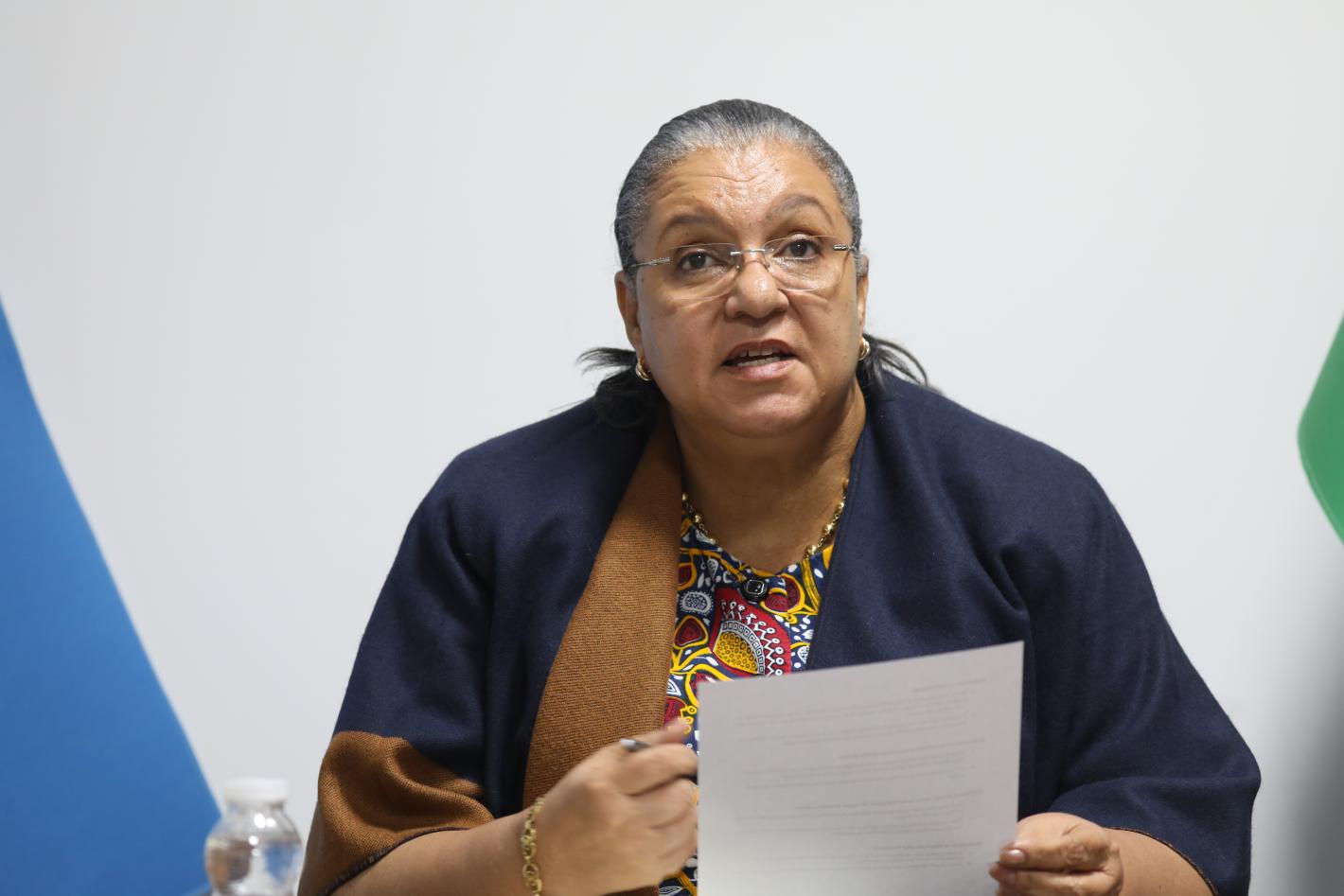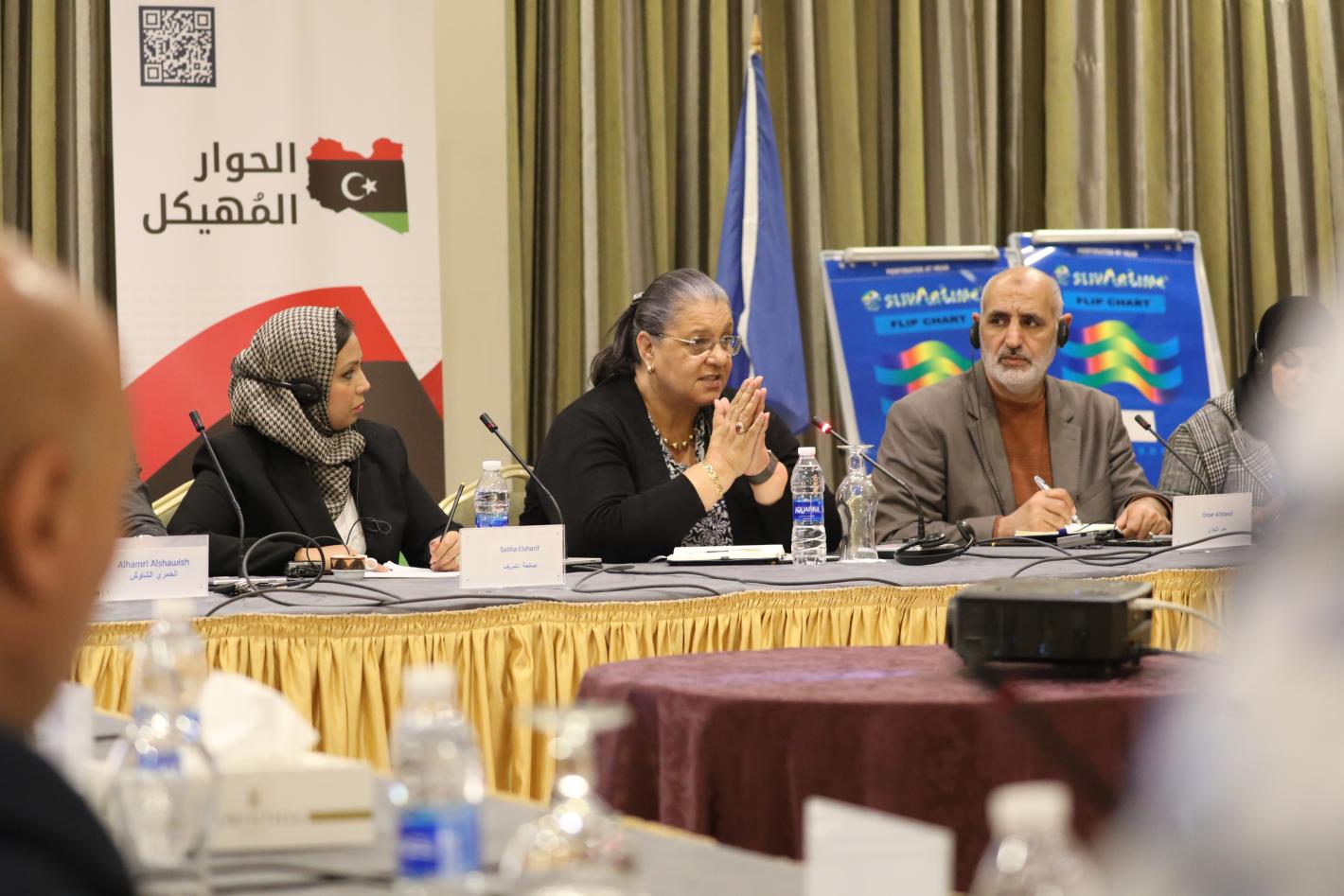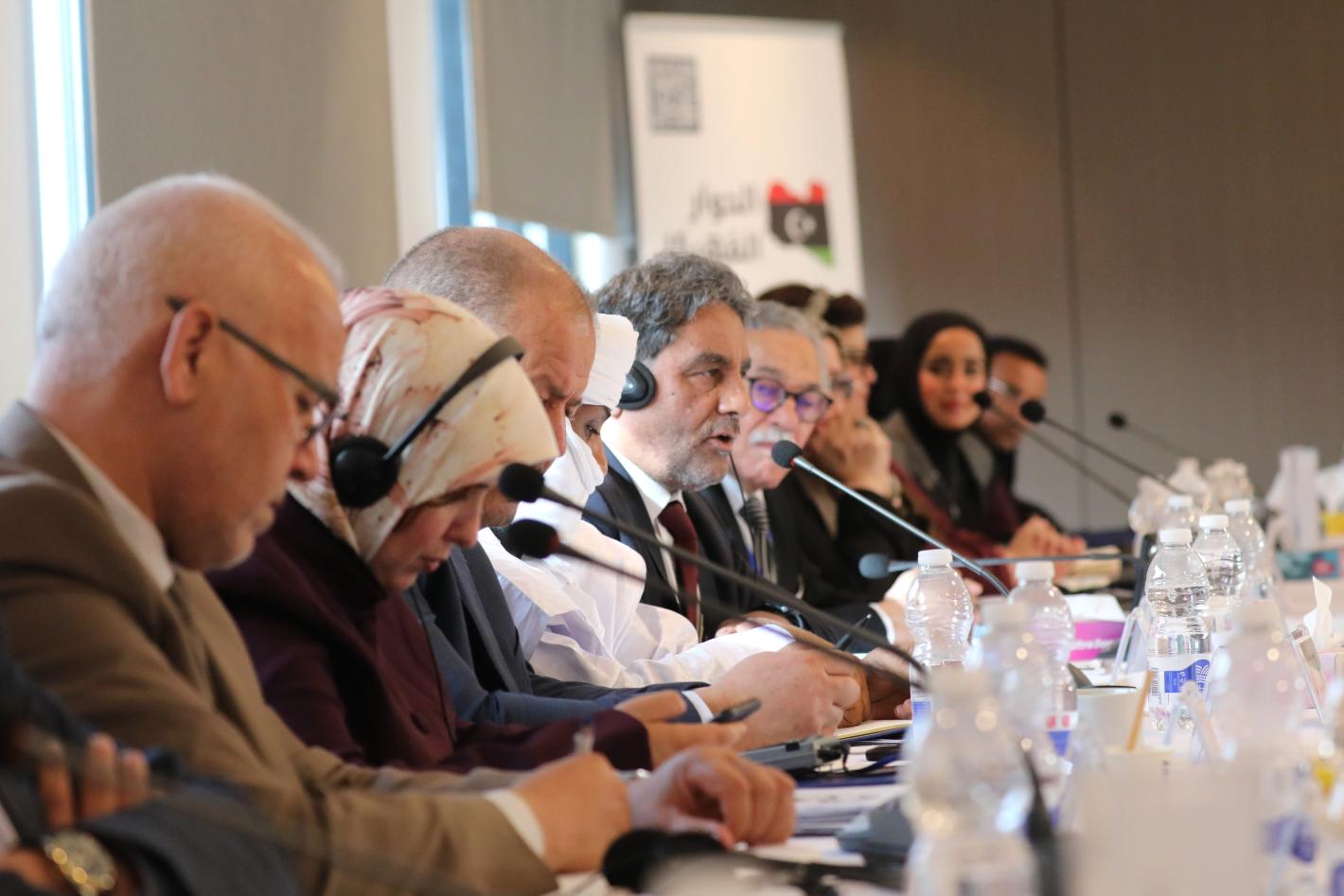(ترجمة غير رسمية)
الكلمة الافتتاحية: شكرا جزيلا على حضوركم. هذه الزيارة تضامن مع الشعب الليبي - الشعب الليبي الذي عانى كثيراً ويستحق أن يعيش في بلد طبيعي فيه مؤسسات سياسية طبيعية بسلام وأمن ورخاء.
ليس للأمم المتحدة أي أجندة ولا مصالح فيما يتعلق بليبيا، بل مصلحة واحدة: خير الشعب الليبي، والسلام في البلاد، وإمكانية العيش في ظل ديمقراطية طبيعية والاستفادة من الثروة الهائلة للبلاد ليستفيد منها مواطنيها. ولهذا السبب نعتقد أن الحل لليبيا يجب أن يكون حلا سياسياً ليبياً وبقيادة ليبية. من خلال التدخل الأجنبي لن نستطيع حل مشاكل أي بلد وبالتالي من المهم أن ينطبق هذا المبدأ أيضاً على ليبيا.
ولهذا السبب وضعنا تصورنا، بالتشاور الوثيق مع الليبيين في جميع أنحاء البلاد، في اللقاءات العامة التي تم إجراؤها في جميع أنحاء البلاد خلال لأكثر من عام، لفكرة عقد ملتقى وطني ليبي - بقيادة ليبية داخل الأراضي الليبية للتمكن من مناقشة مستقبل ليبيا، والتطور السياسي للبلاد، من أجل تحقيق الاستقرار وأن يكون الوضع طبيعياً في ليبيا. الأمم المتحدة ملتزمة تماماً بتنظيم هذا الملتقى الوطني الليبي.
قبل قدومي إلى ليبيا، فوجئت بعدد من التحركات العسكرية وعدد من البيانات العامة التي أثارت بالطبع قلقاً كبيراً.
أود أن أوجه نداءً قوياً للغاية: يجب أن تتوقف جميع التحركات العسكرية، نداءً من أجل احتواء الوضع وعودة الهدوء ووقف التصعيد، التصعيد العسكري والسياسي واللفظي. في الاجتماع الذي عقدته اليوم مع رئيس المجلس الرئاسي، توافقنا على أنه لا يوجد حل عسكري لأي مشكلة في العالم، ولا يوجد حل عسكري للمشاكل في ليبيا. يجب أن يكون الحل سياسياً، ومن الضروري أن يكون الحل السياسي قوياً جداً من خلال الحوار.
أعتقد أنه من الضروري استئناف الحوار وأنا، كأمين عام للأمم المتحدة، على استعداد لتبني أي مبادرة قد تكون ضرورية لتحقيق ذلك إذا تم استيفاء الشروط التي تسمح بها.
أود أيضاً أن أقول إنني زرت اليوم مركز احتجاز للاجئين والمهاجرين، وقد تأثرت بشدة وصدمت بمستوى المعاناة وخاصة بمستوى اليأس الذي وجدته. هذه بالطبع ليست مسؤولية ليبيا فحسب، بل إنها مسؤولية تقع على عاتق المجتمع الدولي بأسره. من الواضح أنه، في ظل الظروف الحالية التي نعيشها، سيكون من الصعب للغاية القول بأن القدوم إلى ليبيا آمن. أناشد المجتمع الدولي أن يفهم الحاجة إلى احترام القانون الدولي للاجئين احتراماً كاملاً وإلى معالجة مشكلة الهجرة بطريقة تتوافق مع الدفاع عن مصالح الدولة وكذلك حقوق الإنسان للمهاجرين.
أنا جاهز لأية أسئلة.
سؤال: سوف تزور بنغازي غداً وتلتقي بـ حفتر، ماذا ستقول له؟
الأمين العام: لا أقول أبداً على الملأ ما يفترض أن أقوله على انفراد في اليوم التالي. سوف يستمع إليّ مباشرة، وليس عبر أي وكالة أنباء. أنا آسف. من الواضح، أن هناك رسالة واضحة قمت بإعلانها على الملأ وقمت بالتصريح بهذه الرسالة قبل دقائق قليلة. أعتقد أنه من الأهمية بمكان أن تدرك ليبيا وأن يدرك الجميع في ليبيا، الحاجة إلى حل سياسي يكون قائماً على الحوار، ومن الواضح بالنسبة لي أننا بحاجة ماسة إلى تجنب دراما ما يمكن أن تكون مواجهة كبيرة، تحديداً مواجهة كبيرة في طرابلس.
من المهم جدًا تهدئة تصعيد التحركات العسكرية والبيانات التي أدلى بها الجميع وأن يسود منطق يسمح بإعادة الهدوء وتبديد الخوف. من الواضح أنه ستكون هناك أشياء مهمة للغاية يجب مناقشتها، ولكن اسمح لي بتركها للاجتماع غداً.
سؤال: خلال زياراتك اليوم لرئيس المجلس الرئاسي فايز سراج ورئيس المجلس الأعلى للدولة خالد المشري، هل شعرت بإرادة حقيقية لإيجاد حل نهائي للمشاكل السياسية في ليبيا، وخاصة في الفترة التي تسبق الملتقى الوطني الذي تنظمه الأمم المتحدة. هل هناك أي خطة للأمم المتحدة لممارسة الضغط على الأطراف الليبية للإسراع بعملية الانتخابات؟
الأمين العام: لقد لمست في كل محادثاتي مع الفرقاء الليبيين دعما قويا للملتقى الوطني ونعتقد أنه الملتقى الوطني، الليبيون أنفسهم، هم الذين يجب أن يحددوا ترتيب الانتخابات المختلفة والتوقيت المناسب لها. كما قلت، ليس لدينا جدول أعمال للأمم المتحدة، أجندتنا هي الشعب الليبي والمصلحة الليبية. نحن نؤمن بأن ليبيا تحتاج إلى توحيد مؤسساتها المختلفة وتحتاج إلى عملية انتخابية تسمح بإجراء الانتخابات البرلمانية والرئاسية على السواء، مرة أخرى بترتيب وبتوقيت يؤمل أن يتمكن المؤتمر الوطني أن يتوصل إليه.
سؤال: التحركات الأخيرة للجنرال حفتر وإعلانه اليوم، في بيان مسجل، الحرب لدخول طرابلس. يأتي هذا التصعيد قبل أيام من الملتقى الوطني. هل لديكم - كمجتمع دولي، الأمم المتحدة ومجلس الأمن - بيانات قوية وإجراءات لوقف هذه الحرب، وإذا استمر التصعيد، فهل هذا يعني أن الملتقى الوطني الذي تنظمه الأمم المتحدة قد فشل؟
الأمين العام: كما قلت بوضوح شديد، فإن عملنا ليس التصعيد بل خفض التصعيد. آمل بقوة أن نشهد خفضاً للتصعيد، العسكري والكلامي، يسمح بالاعتراف بأن ليبيا بحاجة إلى حل سياسي، وليس إلى حل عسكري.
سؤال: هل هناك إمكانية لتأجيل الملتقى الوطني في ضوء التحركات السياسية والعسكرية الأخيرة في طرابلس؟
الأمين العام: ما نريده بالضبط هو التأكد من أن تلك التحركات ستنتهي وأن حالة الهدوء ستعود لأننا نعتقد أيضاً أن ذلك سيكون عنصراً مهماً للغاية لنجاح الملتقى الوطني. من الصعب عقد ملتقى وطني في جو من المواجهة الشاملة، لذلك من المهم للغاية أن يتم خفض التصعيد وان تسود حالة من ضبط النفس والهدوء.
سؤال: هل تواصلت مع الأطراف التي تقف وراء التحركات العسكرية في جنوبي طرابلس وهل تلقيت وعوداً بإنهاء هذه التحركات والتصعيد العسكري والكلامي؟ إذا اشتد التصعيد، لا سمح الله، هل سيعيق هذا الأمر عقد الملتقى الوطني؟
الأمين العام: لم ننهي مهمتنا بعد، وآمل أنه عند الانتهاء من مهمتنا غداً، سنتمكن من الحصول على صورة واضحة عن الوضع، وبالتالي، وإذا أمكن، أن نقوم بمبادرة من مصلحتنا القيام بها فيما يتعلق بالحوار، إذا تمكنّا من التوصل إلى اتفاق على ذلك، لأننا بالضبط نعتقد أنه من المهم إعادة تهيئة بيئة هادئة ليكون الملتقى الوطني ناجحاً. من الواضح أنه يمكننا عقد ملتقى وطني في جميع الظروف، ولكن، لكي ينجح الملتقى يجب أن نكون في بيئة يكون فيها الناس على استعداد للتحدث مع بعضهم البعض في محاولة لإيجاد حلول وليس في بيئة من المواجهة مما يجعل من الصعب للغاية الوصول إلى الحد الأدنى من الإجماع أو الحد الأدنى من الاتفاق على مستقبل مشترك.
شكراً






